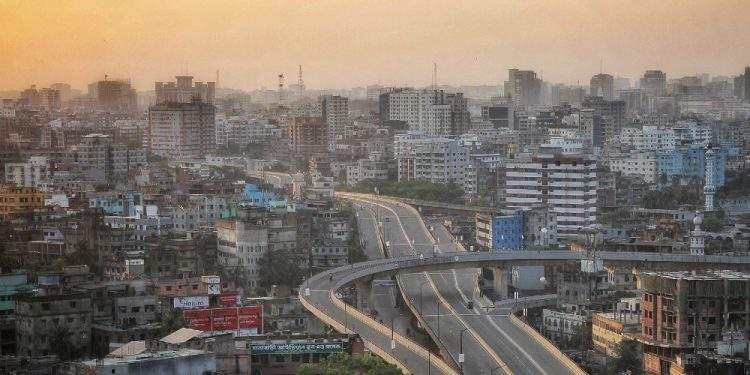The Wuhan coronavirus (COVID-19) pandemic lockdowns were just the beginning, and the globalists will try to control the population once again with climate lockdowns.
In an interview with LifeSiteNews co-founder and editor-in-chief John-Henry Westen, author Marc Morano warned that the COVID-19 lockdowns proved that forcing people to remain in their homes and restricting their economic activity could protect the environment by reducing carbon emissions.
“The COVID lockdowns were literally a version of what they’ve called for decades in the climate movement,” said Morano. “I attend every United Nations climate summit and I’m going to the one in Egypt this year … and what these summits call for is the ‘degrowth movement,’ or ‘planned recessions,’ to fight global warming. And what that means is the government imposes slower economic growth or forces a recession to lower emissions.”
Morano pointed out that the globalists are claiming that the lockdowns and the reduction of so-called emissions are just tools for their ultimate goal, which is total control.
“If you live under authoritarianism, if you live under government control of every aspect of your life, you’re solving viruses, you’re solving climate,” said Morano. “The point is, they want control and they’ll do whatever they have to, whether it’s a virus, whether it’s climate, you name it – they want to invoke emergency powers. That’s really what this is about: emergency powers to bypass democracy.”
Globalist organizations promoting climate change lockdowns
Organizations like the United Nations (UN) and the World Economic Forum have praised the COVID-19 lockdowns and compliance with them for their ability to reduce global emissions.
Morano noted that in 2019, the UN said the world needed to reduce carbon dioxide emissions by around seven percent every year to meet the goals stated in the Paris Climate Agreement.
“One year later, because of the lockdowns, we had a seven percent reduction in carbon dioxide emissions,” said Morano. “It was almost like the UN called it.”
Morano also pointed out how leading members of the UN have praised the lockdowns for how great they supposedly were for the environment, even quoting one climate chief who called lockdowns and the “global shutdown of the economy” the only way to meet the UN’s climate targets.
The UN is not the only organization calling for climate-related lockdowns. The WEF recently praised the lockdowns for their ability to “demonstrate the core of individual social responsibility” and for helping pave the way for the acceptability of climate-related restrictions on freedom of movement and economic participation. (Related: WEF claims that “billions” who obeyed lockdowns and mask mandates will also comply with new globalist “social credit scheme.”)
This comes from a recent report released by the WEF suggesting that policies to track and restrict personal carbon usage could be implemented with widespread compliance almost overnight, thanks to the example of the COVID-19 lockdowns.
“A huge number of unimaginable restrictions for public health were adopted by billions of citizens across the world,” the report stated. “There were numerous examples globally of maintaining social distancing, wearing masks, mass vaccinations and acceptance of contact-tracing applications for public health.”
This compliance could help realize the WEF’s goal of making people live without emitting too much carbon in their daily lives.
More stories about the so-called climate change can be found at ClimateAlarmism.news.
Listen to Marc Morano’s full interview with John-Henry Westen about climate lockdowns.
This video is from the channel LifeSiteNews on Brighteon.com.
More related articles:
- British astrophysicist: Climate change is a scam, scientists promoting it are only trying to make money.
- Patrick Moore criticizes Greenpeace, says it’s been taken over by leftist climate alarmists.
- The government will declare a climate crisis to put people back into lockdown.
- Here come the CLIMATE LOCKDOWNS: World agency demands locking down cities to achieve “climate goals.”
- Like COVID-19, climate alarmism is a tool global elites wield to control our lives.
Sources include:





This is an absolutely naive belief (not that they’ll try it, but that people will comply). There were huge swaths of the country that never implemented any lockdown measures despite being under lockdown orders (like everywhere in Texas outside of the large Democrat cities). People complied with C19 fraud because they were afraid. Now, most realize it was mostly a lie. No one is afraid of climate change despite decades of fear mongering. No one except school kids subjected to fear based mind control believe the climate change BS. If they try lockdowns based on that, the Western world will explode. I really, really hope they do. No way they survive that.
I expect willingness all but the most committed sheep for that to occur again is OVER!
Good luck with that “Globalists”….
Burp.
Wanna bet?
Without opposition? Sure. Watch and see what really happens if they attempt it.
These evil madmen are psychopaths and will continue to threaten the population with hoaxes until we hunt them down at their homes, drag them into he street and tell them nicely to line up against the wall! BANG, and the world will revert to peace and freedom.